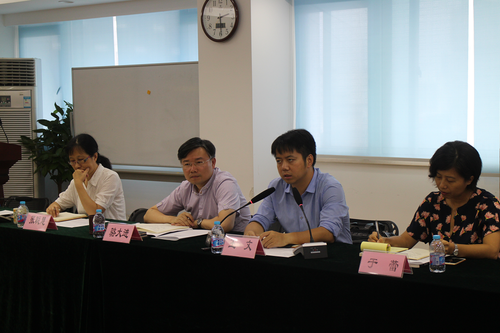SISS Held the Soft Science Research Salon on Construction of New Type Think Tanks
2017-09-01
On the afternoon of August 29, 2017, the third session (35th in total) of Soft Science Research Salon in 2017 was held in the Academic Report Hall 1015 of the SISS. The theme of this session was “Construction of New Type Think Tanks”. Duan Xiaoyang, deputy head of the Development Research Division of Shanghai Municipal Science and Technology Commission, Luo Dajin, secretary of the CPC General Branch and general director, Zhang Conghui, deputy secretary and deputy general director of SISS, Prof. Wang Wen, executive director of Chongyang Finance Research Institute of Renmin University of China, Yu Lei, head of Think Tank Construction Division (Research Office) of Shanghai Academy of Social Sciences, Prof. Du Debin, principal of City and Regional Science College of East China Normal University, Prof. Luo Shougui of Antai Economy and Management College of Shanghai Jiaotong University and Prof. Zhang Jianmin, Shanghai University of Engineering Science attended the salon. The salon was presided over by general director Luo Dajin.
In his keynote address, director Wang Wen pointed out that influence power is the source of a think tank, the construction and operation of a think tank should be centered around raising its influence power as the core objective, including decision-making influence, social influence and international influence powers. The construction of a new type think tank should cover three aspects, one is basing on and surpassing the academy, and reforming the past evaluating criterion with academic aspect as the core priority. The second is paying attention to the characteristics of the achievements of think tank, and improving the writing style to raise the quality of special report. The third is making institutional breakthrough based on marketization. The rapid development that can be achieved since the establishment of “Chongyang of Renmin University” is first attributable to the reform of personnel system, so that personnel can be promoted and demoted, and can advance and retreat, the second is the reform of incentive system, to realize autonomy in budget and highlight the examination and incentives of achievements and influence of activities; and finally, the reform of foreign affairs system, to simplify the review and approval procedure concerning foreign affairs and enable more flexible international cooperation.
Yu Lei presented the main experience and practices of Shanghai Academy of Social Sciences in the construction of national high end think tank. The first is reform of evaluation mechanism, on one hand, the examination of scientific research personnel is not limited to the traditional essays and special works, and also covers special reports, approval instructions, voices on media and attending conferences, and on the other hand, new criteria on professional title promotion were formulated, with classification of base-oriented research fellow and application-oriented research fellow, with importance attached to the fostering of application-oriented research fellow mainly on research for decision-making and consultancy; the second is reform of personnel engagement system, to attract those engaged in leading work in practical sectors or research-oriented leaders in practical sectors to work in Shanghai Academy of Social Sciences; the third is reform of fund allocation, to encourage the initiatives of scientific research personnel by means of providing special funds, accepting transversally entrusted subjects and establishing think tank construction fund.
Participating experts and scholars conducted heated discussions on topics of the operation mechanism of think tank construction, stimulation and evaluation of talents, and problems currently encountered in the think tank construction in universities and colleges and research institutions.






 E-mail Alerts
E-mail Alerts
 沪公网安备 31010402001155号
沪公网安备 31010402001155号